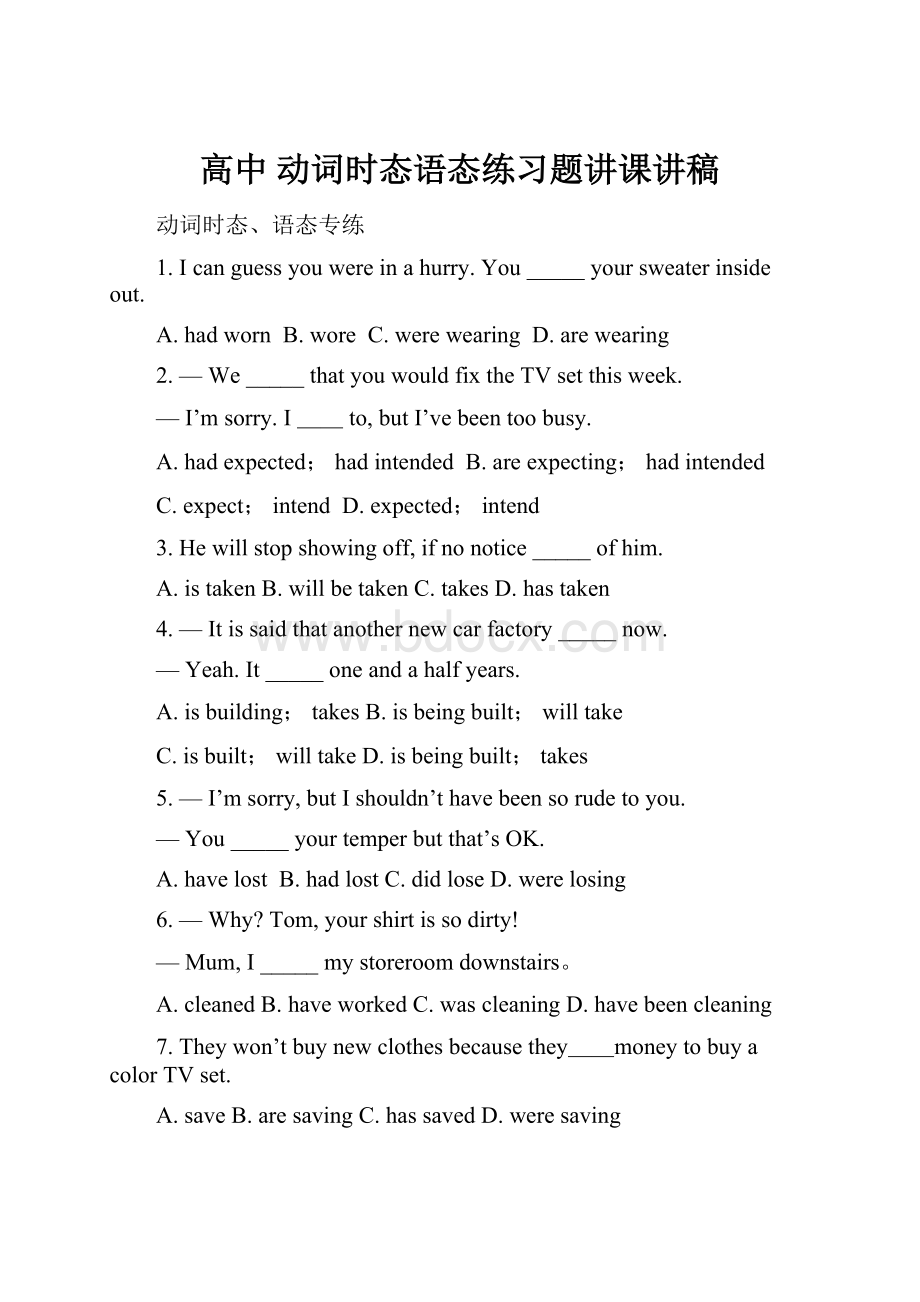高中 动词时态语态练习题讲课讲稿Word格式文档下载.docx
《高中 动词时态语态练习题讲课讲稿Word格式文档下载.docx》由会员分享,可在线阅读,更多相关《高中 动词时态语态练习题讲课讲稿Word格式文档下载.docx(13页珍藏版)》请在冰豆网上搜索。

A.cleanedB.haveworkedC.wascleaningD.havebeencleaning
7.Theywon’tbuynewclothesbecausethey__moneytobuyacolorTVset.
A.saveB.aresavingC.hassavedD.weresaving
8.Goodheavens!
Thereyouare!
We_____anxiousaboutyou,andwe_____youbackthroughoutthenight.
A.are;
expectB.were;
hadexpected
C.havebeen;
wereexpectingD.are;
wereexpecting
9.I’vefinallyfinishedmypaperandit_____meanentiremonth.
A.takesB.tookC.wastakenD.hadtaken
10.Thetrafficinourcityisalreadygoodandit_____evenbetter.
A.getsB.gotC.hasgotD.isgetting
11.—HasJackfinishedhishomeworkyet?
—Ihavenoidea;
he_____itthismorning.
A.wasdoingB.hadbeendoingC.hasdoneD.did
12.—Iwillcometoattendyourlectureat10:
00tomorrow.
—I’msorry,bythenmylecturewillhaveendedandI_____myguestsinmyoffice.
A.isbeingmetB.willmeetC.willbemeetingD.willhavemet
13.—Alicecamebackhomethedaybeforeyesterday.
—Really?
Where_____?
A.hasshebeenB.hadshebeenC.hasshegoneD.hadshegone
14.JohnandI_____friendsforeightyears.WefirstgottoknoweachotherataChristmasparty.Butwe_____eachotheracoupleoftimesbeforethat.
A.hadbeen;
havemetB.havebeen;
havemet
C.hadbeen;
hadmetD.havebeen;
hadmet
15.I_____ping-pongquitewell,butIhaven’thadtimetoplaysincethenewyear.
A.willplayB.haveplayedC.playedD.play
16.I’vewonaholidayfortwotoFlorida.I_____mymum.
A.takeB.amtakingC.havetakenD.willhavetaken
17.—Youhaven’tsaidawordaboutmynewcoat,Brenda.Doyoulikeit?
—I’msorryI_____anythingaboutitsooner.Icertainlythinkit’sprettyonyou.
A.wasn’tsayingB.don’tsayC.won’tsayD.didn’tsay
18.—Where_____?
—Igotstuckintheheavytraffic.I_____hereearlier.
A.didyougo;
hadarrivedB.haveyoubeen;
wouldhavebeen
C.wereyou;
wouldcomeD.areyou;
was
19.IknowMrBrown;
we_____toeachotherataninternationalconference.
A.areintroducedB.havebeenintroduced
C.wereintroducedD.hadbeenintroduced
20.—Wheredoyouthink_____he_____thecomputer?
—Sorry.Ihavenoidea.
A.has;
boughtB./;
boughtC.did;
buyD.had;
bought
21.—I____toaparty,butI’vegotnothingtowear.
—Whydon’tyouhaveadressmadefortheparty?
A.wasaskedB.willaskC.haveaskedD.havebeenasked
22.Ididn’tlikeAuntLucy,who_____withoutwarningandbringinguspresents.
A.alwaysturnedupB.hasalwaysturnedup
C.wasalwaysturningupD.wasalwaysturnedup
23.—WhatdoyouthinkofthiskindofTVset,which_____inShanghai?
—Well,Idon’tcaresuchthings.
A.wasmadeB.ismadeC.hasbeenmadeD.hadbeenmade
24.—Tom,didMr.Lijoinyouinyourdiscussion?
—No,he_____,buthehappenedtohavefallenill.
A.wouldliketoB.willC.wastohaveD.wasgoingtojoin
25.—Didhenoticeyouentertheroom?
—Idon’tthinkso.He_____totheradiowithhiseyesshut.
A.listenedB.waslisteningC.haslistenedD.hadlistened
26.Theplane_____at7:
00p.m.,soIhavetobeattheairportby6:
40atthelatest.
A.hasleftB.istoleaveC.willhaveleftD.leaves
27.Thetrain_____atthepresentspeeduntilitreachesthefootofthemountainataboutnineo’clocktonight.
A.wentB.isgoingC.goesD.willbegoing
28.Lookatthis!
I__somemagazinesand_____thisletter.
A.waslookingthrough;
foundB.amlookingthrough;
find
C.lookedthrough;
hadfoundD.hadlookedthrough;
finding
29.—_____you_____theeditorattheairport?
—No,he_____awaybeforemyarrival.
A.Have...met;
hasdrivenB.Had...met;
wasdriven
C.Did...meet;
hadbeendrivenD.Have...met;
haddriven
30.—Canyougivemetherightanswer?
—Sorry,I_____.Wouldyourepeatthatquestion?
A.hadn’tlistenedB.haven’tlistenedC.don’tlistenD.wasn’tlistening
31.IusedtodrinkalotofteabutthesedaysI_____coffee.
A.preferB.preferredC.havepreferredD.ampreferring
32.—WasthedrivingpleasantwhenyouwenttoMexicolastsummer?
—No,it____forfourdayswhenwearrived,sotheroadswereverymuddy.
A.wasrainingB.hadbeenrainingC.wouldberainingD.rained
33.Thevegetablesdidn’ttasteverygood.They____toolong.
A.hadbeencookedB.werecookedC.hadcookedD.cooked
34.—Rememberthefirsttimewemet,Jim?
—OfcourseIdo.You____inthelibrary.
A.werereadingB.hadreadC.havereadD.read
35.IwanttobuythatkindofclothbecauseI____thecloth____well.
A.havetold;
washesB.havebeentold;
washes
C.wastold;
washedD.havebeentold;
iswashed
36.—Whatwereyouuptowhenyourparentscamein?
—I____forawhileand____somereading.
A.wasplaying;
wasgoingtodoB.played;
did
C.hadplayed;
wasgoingtodoD.hadplayed;
did
37.—Sorry,Iforgettoposttheletterforyou.
—Nevermind,_____itmyselftonight.
A.I’mgoingtopostB.I’vedecidedtopostC.I’llpostD.I’dratherpost
38.Ishouldverymuchliketohavegonetothatpartyoftheirs,but_____.
A.I’mnotinvitedB.Iwasnotinvited
C.IhavenotbeeninvitedD.Ihadnotbeeninvited
39.—IsTomstillsmoking?
—No.BynextSaturdayhe____forawholemonthwithoutsmokingasinglecigarette.
A.willgoB.willhavegoneC.willhavebeenD.hasbeengoing
40.Allbutone_____takepartintheconference__tomorrow.
A.isgoingto;
thatistotakeplaceB.aregoingto;
thatisabouttotakeplace
C.aregoingto;
thatistobetakenplaceD.aregoingto;
whichistobeheld
41.—Areyouavisitorhere?
—That’sright.I____roundtheworldandnowmydreamofcomingtoChina____true.
A.havetraveled;
hascomeB.wastraveling;
hadbeencome
C.amtraveling;
hascomeD.havetraveled;
hasbeencome
42.—____Bettythismorning?
—Notyet,butsheissuretobeherebeforenoon.
A.HaveyouseenB.WillyouseeC.DoyouseeD.Didyousee
43.Jimtalkedforabouthalfanhouryesterday.Never____himtalksomuch.
A.IheardB.didIhearC.IhadheardD.hadIheard
44.Thechildren____veryquiet;
Iwonderwhatthey____upto.
A.were;
arebeingB.arebeing;
areC.are;
doD.arebeing;
do
45.—Lookattheblackclouds.It____soon.
—Sure.Ifonlywe____out.
A.israining;
didn’tcomeB.istorain;
won’tstart
C.willrain;
haven’tstartedD.isgoingtorain;
hadn’tcome
46.He_____articlesforourwall-newspaperthesethreeyears,andhe_____aboutfortyarticles.
A.hasbeenwriting;
haswrittenB.hasbeenwriting;
wrote
C.iswriting;
hasbeenwritingD.haswritten;
haswritten
47.She_____totheofficethanshegotdowntowritingthereport.
A.hasnosoonergotB.hadhardlygotC.nosoonergotD.hadnosoonergot
48.Whenhewasalive,theoldscientistusedtosaythatknowledge____frompracticeandhegainedhisexperiencebydoingalotofpracticalwork.
A.wascomingB.hadcomeC.comesD.wouldcome
49.Inthisexperiment,theyarewokenupseveraltimesduringthenight,andaskedtoreportwhatthey_____.
A.hadjustbeendreamingB.arejustdreaming
C.havejustbeendreamingD.hadjustdreamt
50.—What’sthematter?
—Theshoesdon’tfitproperly.They_____myfeet.
A.arehurtingB.willhurtC.havehurtD.arehurt
动词时态、语态专练参考答案及解析
参考答案
1-5DAABC6-10DBCBD11-15ACBDD16-20BDBCB
21-25DCBCB26-30DDACD31-35ABAAB36-40CCBBD
41-45CADBD46-50ADCCA
解析:
1.D。
canguess这一现在猜测是建立在眼前所见情景的基础上的,故用现在进行时。
2.A。
expect,intend,want,wish,hope,plan等动词的过去完成式可表示过去未曾实现的想法、愿望、打算等。
3.A。
如主句用将来时,在时间、条件和让步状语从句中要用一般现在时表示将来。
又因if从句是takenoticeof...的被动语态结构,故选A。
4.B。
根据主语与build之间的被动关系和now,可知要选现在进行时的被动语态;
因工厂正在修建,花费一年半应指将来。
5.C。
shouldn’thavedone表示“过去本不应……”。
Youdidloseyourtemper是Youlostyourtemper的强调形式。
6.D。
现在完成进行时表示从过去某时到现在一直在进行的动作。
7.B。
句意为:
他们(现在)不愿买新衣服,因为他们在攒钱买电视。
由此可见,攒钱是现阶段正在进行的动作。
8.C。
担心是从过去某时到说话时为止一直在进行的动作,用现在完成时;
expect是在过去某一段时间里(整个晚上)正在进行的动作,故用过去进行时。
9.B。
论文已完成,花费一个月时间应指过去;
某事花费某人多少时间用sth.takessb.sometime结构。
10.D。
交通现在已经好了,在此基础上正在变得更好。
11.A。
题干没有构成“过去的过去”,不可选B。
如选C、D则表示动作已完成,与havenoidea相矛盾。
过去进行时表示过去某段时间或某一时刻正在进行的动作,不涉及结果,正好附合题干语境。
12.C。
bythen是指将来的时间状语,排除A。
再由句意可知,meet指的是到了十点钟时将正在进行的动作。
13.B。
问句问的是前天回来之前去了哪儿,故用过去完成时。
注意hadgone表示人未回来,与第一句相矛盾。
14.D。
for+时间段表示从过去某时延续至今的动作或状态,用现在完成时;
meet发生在gottoknow这一过去动作之前,用过去完成时。
15.D。
用一般现在时表示现在的特征或状态。
16.B。
come,go,leave,arrive,take等动词常用进行时表砂将来。
17.D。
表示过去没有做某事应用去时。
又因句子没有"
过去正在进行"
之意,帮排除A。
18.B。
问对方"
去了哪里"
,指的是从过去某时到现在为止的动作,用现在完成时;
第二个空格是与过去事实相反的虚拟语气和主句,条件状语从句IfIhadn’tgotstuckintheheavytraffic被省略。
19.C。
在一个国际会议上被介绍显然发生在过去。
20.B。
此句为复杂特殊疑问句结构,即“疑问词+doyouthink(believe,suppose,expect,imagine,say,consider,guess等)+其它(陈述语序)?
”。
21.D。
由but分句中的现在时和答语所提建议内容,可知应选现在完成时的被动语态。
22.C。
always,often,constantly,forever,allthetime等副词与现在(过去)进行时连用,表示某种反复发生的动作,往往带有厌恶、不满、责备或赞扬